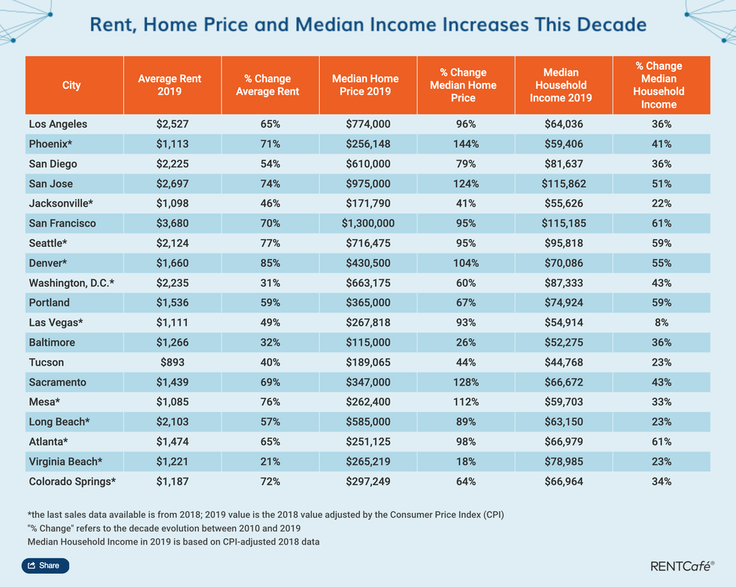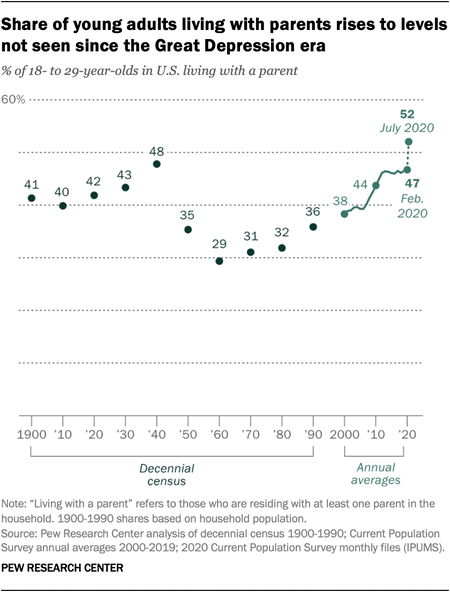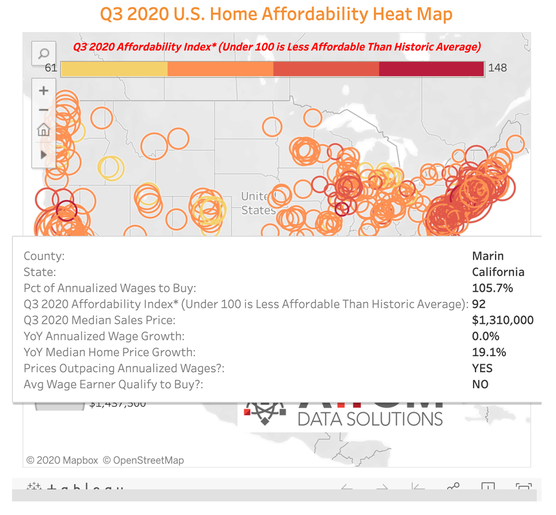|
Including an 8-Point checklist for would-be home buyers. Join me for my Real Estate Videoconference on November 12, 2020 at 5 pm PT. Email [email protected] for the logon instructions. Watch it back at YouTube.com/NataliePace. Recently there have been a lot of people itching to buy a home. Maybe it’s the low mortgage interest rates. Perhaps it is the pandemic. With rents so high, it feels like you are just flushing money down the toilet. You’ve watched your homeowner friends brag about how much equity they now have. And now that you can work from pretty much anywhere, maybe you’re thinking of exiting city-life for the more affordable suburb. What is not tempting is the home price itself. Home and rent prices have skyrocketed over the past decade, particularly in the West. Meanwhile, wages have not kept apace. One of my coaching clients is looking to settle down with his fiancée. His annual salary averages about $75,000/year. He qualifies for a $500,000-$600,000 loan. However, in Los Angeles, where he lives, he’s priced out of many neighborhoods. A $600,000 mortgage (over $30,000 annually) would take up 40% of his income – far higher than is recommended for housing costs. However, if he doesn’t buy, his rent could easily cost just as much. It’s easy to understand why he wants to bite the bullet and just buy something – anything. However, buying high and having your home value drop significantly below your mortgage can be hell for years. So can being property rich and cash poor. There is often some unexpected, big-ticket repair that has to be fixed every 7-10 years – whether it is plumbing, a new roof or a tree falling on your car. If you’re overleveraged on the mortgage, you might have to put emergencies on a credit card. It’s hard to be a patient buyer when prices for rent and homeownership keep going up. (It doesn’t make sense, given the negative economic impact of the pandemic and recession, until you factor in the moratoria on evictions and foreclosures. More on that later.) Industry experts predict the rising price trend to continue in 2021 due to a housing shortage. (Click to read my interview with Mike Fratantoni, the chief economist of the Mortgage Bankers Association.) However, once you own the home, it is yours – for better or for worse. So, you simply must do the math on affordability and on price, and create your own opportunity, in a world were none of this adds up. Getting creative is the only process that will get you there. When you take the time and apply the necessary tools to get it right, you’ll come out on the other side with a sanctuary home that you love and can afford, without breaking the family budget. Check out 7 Case Studies in the Real Estate section of The ABCs of Money for real-world examples of navigating home and income-property ownership. There you will find stories of real people who have overcome challenges, seized opportunities and made brave choices to create the home and life of their dreams. Click to watch Alvin and Jada’s story in their 4-minute film on EarthGratitude.org. 8-Point Checklist for Home Buyers. Sanctuary Home The Thrive Budget Intergenerational Housing The 3-Ingredient Recipe for Cooking Up Profits Shopping in the Shadow Inventory Safe, Income-Producing Hard Assets that You Purchase for a Good Price Will Real Estate Ever Be Affordable Again? Climate Change And here is more color on each point. Sanctuary Home Your home is ultimately the place where you renew your spirit and nourish your dreams. You will thrive if you find a city and neighborhood that reflect your values, where the people get you. Factor in all that you love doing and the little things that make you smile when considering where you want to live. When you think that this is going to be your home for the next decade or more, you’ll be glad you picked a place where you enjoy living. The Thrive Budget Overspending on housing creates stress and could put you into unsustainable debt, particularly when the other big-ticket items, like transportation, health insurance, food, cable, phone, utilities, student loan debt, taxes and WIFI can bury you in bills. There are ways, through smarter choices on your big-ticket items, to keep these expenses down. (Read the Thrive Budget section of The ABCs of Money for details.) The target is 50% to survive and 50% to thrive. If you’re spending more than 1/3 of your income on housing costs, you might start resenting rather than loving your home. Credit card debt could start amassing and compounding, putting you in the hole. Many cities are unaffordable at this time. That’s one of the reasons why intergenerational housing has become de rigueur. Intergenerational Housing 52% of young adults aged 18-29 are living with at least one parent. This is higher than in the Great Depression, which should tell you something about the challenges we face today – that includes, but is not limited to, unaffordable housing. Thinking about this as an opportunity might actually be a blessing in disguise. Having everyone in the family overspending on housing makes others rich. You can keep more of the wealth in the family, and beef up your liquidity to prepare for better housing opportunities, if you look at housing from an intergenerational perspective. The 3-Ingredient Recipe for Cooking Up Profits The recipe is simple. The devil is in the details. In most markets, you’re going to have to shop in the shadow inventory to get the 3rd ingredient right.
Shopping in the Shadow Inventory There are 3.5 million homes that are severely underwater. In September 2020, 8.5% of renters, 7.1% of homeowners and 40% of student debt borrowers missed a payment (source: Mortgage Bankers Association). There is a lot more distress in housing than you are hearing about – including a trend in some cities, like NYC and San Francisco, where some apartment buildings have become ghost towns. Home prices have dropped almost 5% in both of those cities. For sale listings in San Francisco are up 96% year over year. If you are shopping on the MLS, then you are missing a lot of the opportunities that could start showing up in 2021, after the current moratoria on foreclosures and evictions expires. When 3.4 million people are not paying their mortgage, there could be a lot more opportunity on the horizon than impatient, antsy buyers realize today. Safe, Income-Producing Hard Assets that You Purchase for a Good Price Hard assets should hold their value better than paper assets in the coming years where there is just too much debt floating around. However, you always have to be careful about buying at an all-time high. You’ll also need to be aware of what could potentially produce income in a post-pandemic world. Shopping in the shadow inventory could create opportunities of purchasing at a discount of up to 35%. Will Real Estate Ever Be Affordable Again? At the top, the industry experts always say that real estate prices will keep going up, up, up. Will the trend toward intergenerational housing create more supply? Will the underwater mortgages create greater distress in the homeowners who hold this debt? Will the homeowners who are behind on their payments fall into foreclosure? As Todd Teta, the chief product officer with ATTOM Data Solutions, wrote on September 24, 2020, “A plight would normally drop home demand and prices.” This tendency has been curtailed with the moratoria on evictions and foreclosures, and with a shortage of housing. However, there is an expiration date on these policies. Markets do correct. The areas that are the least affordable tend to be the areas that drop the most dramatically. The Multiple Listing Service doesn’t include the shadow inventory, or account for folks who opt for intergenerational housing. All of these factors are already conspiring to negatively impact home prices in San Francisco and New York City (which are still unaffordable). There are also the 4 Ds that can cause a dramatic drop in real estate prices – death, disaster, divorce and depression (or recession). Climate Change and Natural Disasters There are many cities on the East Coast that are dealing with rising sea levels. Not only does this stress out residents and home owners and increase their insurance costs, it also affects home prices. As you can see from the chart above, home prices in Virginia Beach, Virginia have increased only 18% in the past decade, far underperforming most cities in the U.S. Other areas, like Arizona, are dealing with a diminishing supply of fresh water and water wars, or increasing risk of hurricanes and flooding, like the Gulf States. California has been blessed to have a respite from catastrophic earthquakes. However, in 1989, San Francisco’s Marina area had major damage due to liquefaction of the soil in the area, causing 7 buildings to collapse and 63 other structures to be condemned. A double-decker freeway in Oakland collapsed, as well. In 1994, Los Angeles suffered about $35 billion in damages from the Northridge Earthquake. As that quake came on the heels of the Rodney King Riots (1992) and a recession (1990-1991), there was a population exodus. Real estate values dropped by half in the early 1990s in Los Angeles, even in beach areas that are typically more buoyant. The Bottom Line Buying high in real estate or purchasing more home than you can truly afford can create a living hell for you that is difficult to extricate yourself from. Once you own a home, it’s yours. Real estate is not a buy and flip proposition in 2021, even though prices are predicted to remain high, according to the housing industry economists. So, if you do wish to purchase, keep the 8-point checklist in mind. Buy what you can afford. Shop in the shadow inventory and create a better buying opportunity, where you might be able to get a discount on the price. Get creative and determine whether intergenerational housing is right for you. Successful investing always requires being a patient buyer ad an opportunistic seller. If you’d like to learn more about how to shop in the shadow inventory, or how to think bigger to get a better deal and create some income support, then join me for my Real Estate Master Class on January 23, 2020. Call 310-430-2397 for pricing and information. You’ll receive the best price if you register by Nov. 30, 2020. https://www.nataliepace.com/realestatemc.html Real estate is an important part of your wealth strategy. However, buying high in real estate can be one of the most expensive lessons you'll ever learn. For that reason, we spend one full day on what's safe and real estate at our Investor Educational Retreats. Register for the Jan. 16-18, 2021 New Year, New You Retreat by Nov. 30, 2020 to receive the best price. Learn more in the retreat flyer. (Click to access). Other Blogs of Interest Real Estate in a Pandemic. Interview with Mike Fratantoni, the Chief Economist of the Mortgage Bankers Association. Bonds are Illiquid & Negative-Yielding. Annual Rebalancing is a Buy Low, Sell High Plan on Auto-Pilot. 5 Red Flags of a Financial Implosion Will Regeneron Be Approved Before the Election? Tesla Will Have an Outstanding Earnings Report Should You Wait Until After the Election to Fix Your Wealth Plan? The October Surprise Is Your Bank a Junk Bond Do Stocks Fare Better Under Democrats or Republicans? Put Your Money Where Your Heart Is. Crystal Ball for the Remainder of 2020 (Including the Election). Microcap Gaming Company Doubles 2Q 2020 Revenue. Apple & Tesla Stock Splits. Schwab's Chief Fixed Income Strategist on What's Safe. China's Tesla (Nio). 2Q Sales Soar. Why Are You Still Renting? (Errr. There is More Than This to Consider!) MedMen's Turnaround Plan Attracts A-List Board Members. Wealth Myths That Keep You Poor. Prosperity Truths That Make You Rich. Protecting Your Wealth and Home in a Recession. Technology and Silver are Golden. The Economy Contracts 32.9% in the 2nd Quarter of 2020. Real Estate: Feeling Equity Rich? Make Sure That Feeling Isn't Fleeting. Airline Revenue Plunges 86%. 10 Questions for College Success Bank Earnings Season. Crimes. Cronyism. Speculation. Real Estate Solutions for a Post-Pandemic World. Copper and Chile Update. Gold Soars. Some Gold Funds Tank. Will the Facebook Ad Boycott De-FANG Stocks? Why Did My Cannabis Stock Go Down? Which Countries Are Hot in a Global Pandemic? Is Your Financial Advisor Good at Navigating Stormy Seas? $10 Avocados, Lies, Damn Lies, Statistics & Wall Street Secrets. It's Never a Crash. Work From Home and Intergenerational Housing. Biotech Races for a Coronavirus Cure. Are You Worried About Money? May is a Good Time for Rebalancing. Is FDIC-Insured Cash at Risk of a Bank Bail-in Plan? Why Did my Bonds Lose Money? Cannabis Update. Recession Proof Your Life. Free Videocon Monday, May 10, 2020. The Recession will be Announced on July 30, 2020. Apple Reports Terrible Earnings. We Are in a Recession. Unemployment, Rising Stocks. What's Going On? 8 Money Myths, Money Pits, Scams and Conspiracy Theories. 21st Century Solutions for Protecting Your Home, Nest Egg & Job. Wall Street Insiders are Selling Like There is No Tomorrow. Why Are My Bonds Losing Money? Tomorrow is Going to be Another Tough Day. Price Matters. Stock Prices are Still Too High. Should You Ride Things Out? 7 Recession Indicators Corona Virus Update. The Bank Bail-in Plan on Your Dime. NASDAQ is Up 6X. CoronaVirus: Which Companies and Countries Will be Most Impacted. Is Tesla Worth GM and Ford Combined. Artificial Intelligence is on Fire. Is it Time to Buy S'More? Take the Retirement Challenge. 2020 Investor IQ Test. Answers to the 2020 Investor IQ Test. The Cannabis Capital Crunch and Stock Meltdown. Does Your Commute Pollute More Than Planes? Are Health Care Costs Killing Your Budget? 2020 Crystal Ball. The Benefits of Living Green. Featuring H.R.H. The Prince of Wales' Twin Eco Communities. What Love, Time and Charity Have to do with our Commonwealth. Interview with MacArthur Genius Award Winner Kevin Murphy. Unicorns Yesterday. Fairy Tales Today. IPO Losses Top $100 Billion. Price Matters. Will There be a Santa Rally? It's Up to Apple. Harness Your Emotions for Successful Investing. What the Ford Downgrade Means for Main Street. The Dow Dropped Over 1000 Points Do We Talk Ourselves into Recessions? Interview with Nobel Prize Winning Economist Robert J. Shiller. Ford is Downgraded to Junk. Gold Mining ETFs Have Doubled. The Gold Bull Market Has Begun. The We Work IPO. The Highs and Hangovers of Investing in Cannabis. Recession Proof Your Life. What's Your Exit Strategy? It's Time To Do Your Annual Rebalancing. Are You Suffering From Buy High, Sell Low Mentality? Financial Engineering is Not Real Growth. The Zoom IPO. Uber vs. Lyft. Which IPO Will Drive Returns? Boeing Cuts 737 Production by 20%. The Lyft IPO Hits Wall Street. Should you tak Cannabis Doubles. Did you miss the party? 12 Investing Mistakes The High Cost of Free Advice. 2018 Was the Worst December Since the Great Depression. Russia Dumps Treasuries and Buys Gold OPEC and Russia Cut Oil Production. Important Disclaimers Please note: Natalie Pace does not act or operate like a broker. She reports on financial news, and is one of the most trusted sources of financial literacy, education and forensic analysis in the world. Natalie Pace educates and informs individual investors to give investors a competitive edge in their personal decision-making. Any publicly traded companies or funds mentioned by Natalie Pace are not intended to be buy or sell recommendations. ALWAYS do your research and consult an experienced, reputable financial professional before buying or selling any security, and consider your long-term goals and strategies. Investors should NOT be all in on any asset class or individual stocks. Your retirement plan should reflect a diversified strategy, which has been designed with the assistance of a financial professional who is familiar with your goals, risk tolerance, tax needs and more. The "trading" portion of your portfolio should be a very small part of your investment strategy, and the amount of money you invest into individual companies should never be greater than your experience, wisdom, knowledge and patience. Information has been obtained from sources believed to be reliable. However, NataliePace.com does not warrant its completeness or accuracy. Opinions constitute our judgment as of the date of this publication and are subject to change without notice. This material is not intended as an offer or solicitation for the purchase or sale of any financial instrument. Securities, financial instruments or strategies mentioned herein may not be suitable for all investors.  About Natalie Pace Natalie Wynne Pace is an Advocate for Sustainability, Financial Literacy & Women's Empowerment. She has been ranked as a No. 1 stock picker, above over 835 A-list pundits, by an independent tracking agency (TipsTraders). The ABCs of Money remained at or near the #1 Investing Basics e-book on Amazon for over 3 years (in its vertical), with over 120,000 downloads and a mean 5-star ranking. The 4th edition of The ABCs of Money was released on October 17, 2020. Natalie Pace's easy as a pie chart nest egg strategies earned gains in the last two recessions and have outperformed the bull markets in between. That is why her Investor Educational Retreats, books and private coaching are enthusiastically recommended by Nobel Prize winning economist Gary S. Becker, TD AMERITRADE chairman Joe Moglia, Kay Koplovitz and many Main Street investors who have transformed their lives using her Thrive Budget and investing strategies. Click to view a video testimonial from Nilo Bolden. 26/11/2020 02:41:29 am
Roof is one of those things whose maintenance is very much essential for the maintenance of other things in a house. Thus, it's essential to hire professional workers for the process of roofing and keep your house in a good condition. Comments are closed.
|
AuthorNatalie Pace is the co-creator of the Earth Gratitude Project and the author of The Power of 8 Billion: It's Up to Us, The ABCs of Money, The ABCs of Money for College, The Gratitude Game and Put Your Money Where Your Heart Is. She is a repeat guest & speaker on national news shows and stages. She has been ranked the No. 1 stock picker, above over 830 A-list pundits, by an independent tracking agency, and has been saving homes and nest eggs since 1999. Archives
July 2024
Categories |











 RSS Feed
RSS Feed